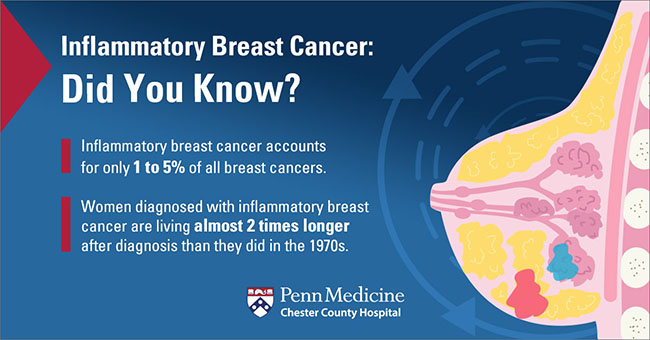
A lump in your breast or underarm. Pain in your breast. Red or flaky skin on your breast or nipple.
From a relatively young age, women are told what symptoms of breast cancer to look out for. You may have learned this information in a high school health class, from a parent or sibling, or your doctor.
Breast cancer is the second most common cancer for women in America, with an average lifetime risk of 13%. Thanks to the wealth of information available about early warning signs, you may know everything there is to know about mammograms or be familiar with the common breast cancer symptoms.
But Inflammatory Breast Cancer (IBC) is another cancer type that rarely shows up like women typically expect.

Identifying Symptoms of Inflammatory Breast Cancer
Typically, the symptom women are told to look out for is a painless but hard lump in the breast or underarm. Using monthly self-exams and regular check-ups, you should know what your breasts look and feel like regularly to help you identify any potential changes — which you should report to your Chester County Hospital provider right away.
“Unlike other forms of breast cancer, inflammatory breast cancer forms in layers, meaning there is no lump to detect during a breast exam or mammogram. This means it is critical to know the symptoms of IBC so it can be detected and diagnosed as early as possible,” explains Catherine M. Porter, DO, Chair of the Breast Health Program at Chester County Hospital in West Chester, PA.
Symptoms of inflammatory breast cancer include:
-
Swelling of the breast (edema)
- Thickening or dimpling creating an orange-peel like look to the breast skin
- Swelling of lymph nodes near the collarbone or in the armpit
- Pain, tenderness, warmth, or itchiness in the breast
- Redness of breast skin or discoloration on more than one-third of the breast
- Retracted or inverted nipple
Getting an Inflammatory Breast Cancer Diagnosis
Paying attention to symptoms of IBC is the first step, but getting a diagnosis is just as important. Chester County Hospital offers multiple tests to diagnose inflammatory breast cancer.
These tests include:
- Digital Mammogram Including 3D Digital Breast Tomosynthesis (DBT): This diagnostic test uses X-rays to create a 3D rendering of the breast, allowing it to be viewed in layers or “slices.”
- Breast MRI: A breast MRI uses radio waves and strong magnets — rather than X-rays — to create detailed images of the breast. These images can enable your Chester County Hospital provider to locate and diagnose breast tumors.
- Breast Ultrasound: Ultrasounds have a variety of uses, including breast examination. Ultrasounds use high-frequency sound waves to detect abnormalities in soft-tissue organs like the breast.
- Diagnostic Surgery or Biopsy: During a biopsy, a small portion of the breast tumor is removed and analyzed. Your provider can examine biopsy samples for hormonal markers or genetic mutation.
- PET or CT Scan: If cancer is suspected to have spread to other parts of the body, like the lungs, brain, or bones, your provider may order a positron emission tomography (PET) or computed tomography (CT) scan.
A cancer diagnosis can bring about a million and one questions you may want to ask your provider. But sometimes it can be hard to remember at the moment exactly what to ask. Our checklist of questions to ask your cancer team about IBC is a helpful resource.
At Chester County Hospital, the patient-provider relationship is critical — and your relationships with your healthcare provider or cancer team are a two-way street. We are here to provide information, resources, and support.
Available Treatment Options for Inflammatory Breast Cancer
At Chester County Hospital, we offer a variety of treatment options for inflammatory breast cancer treatment.
- Chemotherapy attacks cancer cells using either oral or intravenous (IV) drugs. These drugs are designed to slow or stop cancer cell growth.
- Targeted Therapy blocks the growth of cancer cells in specific proteins or genes if your breast cancer is HER2-positive, hormone-positive, or related to a BRCA gene mutation.
- Immunotherapy activates your immune system to find and destroy cancer cells and may be recommended if you have triple-negative.
- Hormone Therapy helps stop cancer cells from growing by blocking the production or the effects of estrogen, progesterone, and testosterone.
- Surgery can help your team prevent, eliminate, and understand your breast cancer.
- Radiation Therapy destroys any remaining cancer cells following surgery or chemotherapy or shrinks existing tumors before surgery.
- Clinical Trials offer you the opportunity to participate in innovative and cutting-edge breast cancer treatments.
No One Fights Alone
A diagnosis of inflammatory breast cancer can be scary and isolating — and sometimes even just learning new information can feel overwhelming.
Whether you are attending your scheduled mammogram, feel a lump in your breast, or notice symptoms of inflammatory breast cancer, the Chester County Hospital community is here to walk beside you along the way.
For questions or concerns about your breast health, contact your Chester County Hospital primary care provider or request a callback from Chester County Hospital.